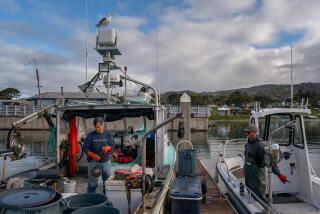Suit Is Filed to Restrict Tuna Imports
- Share via
Earth Island Institute, the Marine Mammal Fund and environmentalist David Brower went to court Monday to attempt to force the federal government to immediately ban imports of tuna caught by five foreign fleets.
The move was aimed at boats from Mexico, Panama, Venezuela, Ecuador and Vanuatu.
The environmental groups, old campaigners against tuna-fishing methods that harm dolphins, charge that the Commerce Department’s National Oceanic and Atmospheric Administration (NOAA) has yet to determine whether these fleets’ dolphin mortality rates are within limits set by the Marine Mammal Protection Act.
Until then, they contend, yellowfin tuna caught in the Eastern Tropical Pacific cannot legally be imported.
Earth Island estimates that as much as 30% of the tuna sold in the United States comes from these foreign boats.
Yellowfin tuna and dolphin swim in tandem in the Eastern Tropical Pacific, and net fishing there has killed tens of thousands of dolphins annually. Most of the battle over dolphins and tuna in recent years has centered on yellowfin caught in this area.
Jay S. Johnson, NOAA deputy general counsel, denied that the government was tardy in implementing the law. He said Monday that under a NOAA plan, foreign fleets have a deadline of July 31 to provide the required information.
But a lawyer for the environmentalists said that, legally, the ban must be imposed first. He said it can be relaxed only after NOAA has determined that the fleets’ dolphin kill rate conforms with the law.
“If you read their (plan), they have until the end of the year to decide to impose a ban,” said Cynthia Koehler of San Francisco’s Heller, Ehrman, White & McAuliffe.
“It’s a question of how reasonable and diligent the government is being in carrying out this law,” said Johnson of NOAA. “Obviously we believe we are being as reasonably diligent as we can be, dealing with all these foreign countries.”
“The legal question,” insists Koehler, “is does the statute require an embargo until a determination is made?”
The environmentalists’ move for a preliminary injunction is part of a larger suit the groups launched in 1988.
“This is just one of those in the middle of the progress moves that keeps you on your toes,” Johnson said.
More to Read
Sign up for Essential California
The most important California stories and recommendations in your inbox every morning.
You may occasionally receive promotional content from the Los Angeles Times.










